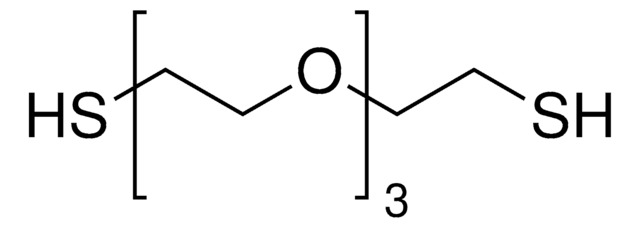717142
Poly(ethylene glycol) dithiol
average Mn 1,000, thiol
Synonym(s):
Polyethylene glycol, PEG dithiol
About This Item
Recommended Products
product name
Poly(ethylene glycol) dithiol, average Mn 1,000
form
solid
Quality Level
mol wt
average Mn 1,000
reaction suitability
reagent type: cross-linking reagent
reactivity: thiol reactive
mp
29-33 °C
Ω-end
thiol
α-end
thiol
polymer architecture
shape: linear
functionality: homobifunctional
storage temp.
2-8°C
Looking for similar products? Visit Product Comparison Guide
Application
Other Notes
Signal Word
Warning
Hazard Statements
Precautionary Statements
Hazard Classifications
Eye Irrit. 2 - Skin Irrit. 2 - STOT SE 3
Target Organs
Respiratory system
Storage Class Code
11 - Combustible Solids
WGK
WGK 3
Flash Point(F)
Not applicable
Flash Point(C)
Not applicable
Certificates of Analysis (COA)
Search for Certificates of Analysis (COA) by entering the products Lot/Batch Number. Lot and Batch Numbers can be found on a product’s label following the words ‘Lot’ or ‘Batch’.
Already Own This Product?
Find documentation for the products that you have recently purchased in the Document Library.
Customers Also Viewed
Articles
Hydrogel-based biomaterials for cell delivery and tissue regeneration applications are discussed.
Hydrogel-based biomaterials for cell delivery and tissue regeneration applications are discussed.
Hydrogel-based biomaterials for cell delivery and tissue regeneration applications are discussed.
Hydrogel-based biomaterials for cell delivery and tissue regeneration applications are discussed.
Our team of scientists has experience in all areas of research including Life Science, Material Science, Chemical Synthesis, Chromatography, Analytical and many others.
Contact Technical Service














